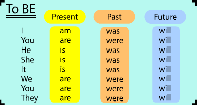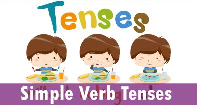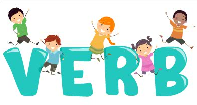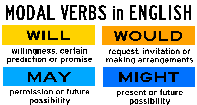Change Avatar
Modal Verbs
Modal Verbs
A challenging maze game that will glue you to your seat until you finish all the levels. This game is adeptly designed for Fifth Grade kids to help them understand how to use correct modal verbs in English. In this game, kids have to make their scorpion eat bugs in the maze that represent correct answers. Each bug is color coded with answer options. For this kids would have to use the arrow keys to move their scorpion in the maze and answer as many questions they can. This game is a perfect way to practice using correct modal verbs and improver hand eye coordination as well.
How to play Modal Verbs

What are Modal Verbs?
Modal verbs are weird verbs because they don’t follow the regular rules - they’re rebels and outlaws! As such, we refer to them as “auxiliary verbs” because they need another verb to latch onto for meaning. They always express a hypothetical.
It’s the difference between
Examples include:
• I go to the library on Tuesdays.
• I can go to the library on Tuesdays.
• I could go to the library on Tuesdays.
The first indicates you actively go to the library on Tuesdays, while the second indicates your ability to go without a definite. The third shows the possibility of you being able to go. Can and Could are modals.
How do you form a modal?
You don’t - you use them as-is. They don’t have a specific ending and don’t function in an infinitive form, but can alter the meaning of a sentence significantly. However, they ALWAYS need another verb and, as such, are often considered to be helping verbs.
It sounds more confusing than it actually is once you see what the verbs are. The chart below shows them in terms of the certainty they express. Either it shows the verb will definitely happen, or they indicate some degree of uncertainty.
| DEFINITE | INDEFINITE |
|---|---|
| can | could |
| must | may, might |
| shall | should, ought |
| will | would |
How do you use modal verbs?
There are several ways to use modal verbs depending on the meaning you wish to convey. Each modal can have multiple meanings depending on how it’s used in a sentence. Here are some examples of the different meanings of each of the major modal verbs.
| Modal Verb | Meaning | Example Sentence |
|---|---|---|
| CAN | ability | I can bench 150 pounds. |
| Informal permission | Can I help you with your luggage? | |
| possibility | Eating too many sweets can cause obesity. | |
| MUST | strong obligation | You must come see this immediately. |
| Inference/ logical conclusion/ certainty | She must be exhausted after running the marathon. | |
| MUST NOT | Prohibition / restriction | You must not lie to your parents. |
| SHALL | Asking what to do | Shall we have some tea? |
| offer | Shall I grab your coat? | |
| suggestion | I shall have to help you next time. | |
| WILL | Instant decision | I will go home now. |
| promise | I will be there soon. | |
| invitation | Will you come with me to the show? | |
| prediction | It will be cloudy tomorrow. | |
| Future tense auxiliary | Next week, I will be here early. | |
| COULD | suggestion | I could help you with decorating these cookies. |
| request | Could I please use your pen? | |
| Ability in the past | I could have been a champion diver. | |
| Ask for permission | Could I please go to the bathroom? | |
| MAY | possibility | I may try to go to the library tomorrow. |
| Ask for permission | May I have a piece of pie? | |
| MIGHT | Slight possibility | She might lose her tooth tonight. |
| Past form of “may” when telling what someone else said | Grandma said she might stay home. | |
| SHOULD | advice | Should I stay here or go? |
| Recommending action | You should try this candy. | |
| Uncertain prediction/guess | It should begin in a few minutes. | |
| Logical deduction/inference | I studied hard, so I should be ready to take the exam. | |
| OUGHT TO | advice | You ought to wear your coat in the rain. |
| Logical deduction/inference | 15 minutes ought to be enough time to bake these cupcakes. | |
| WOULD | Asking for permission | Would you like to dance? |
| request | Would you please come here? | |
| invitation | Would you like to come with me? | |
| preference | I would prefer the aisle seat. | |
| habit | When I went to camp, I would swim every night. |
Using modals depends on the tense and the amount of certainty you wish to convey. With practice, you’ll get the hang of using these oddball verbs.










